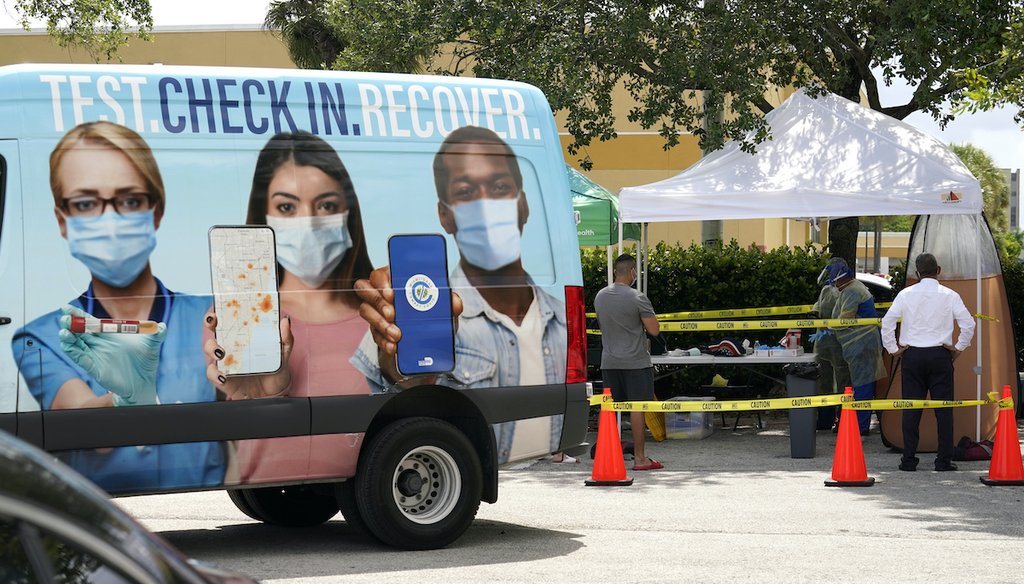Stand up for the facts!
Our only agenda is to publish the truth so you can be an informed participant in democracy.
We need your help.
I would like to contribute

People wait in line at a Miami-Dade County COVID-19 testing site on July 26, 2021, in Hialeah, Fla. (AP)
If Your Time is short
-
Preliminary research in China shows the viral load of delta infections was about 1,000 times higher than the strains of earlier infections.
-
Researchers said that the data suggests “more infectiousness of the delta variant at the early stage of the infection.”
-
Some American scientists have extrapolated that one second of exposure to the delta variant is equivalent to 15 minutes of exposure to the original SARS-CoV-2. But that doesn’t mean you’ll get infected, and not everyone agrees with that calculation.
The delta variant now represents more than 83% of new coronavirus cases in the U.S., the Centers for Disease Control and Prevention said. And a new study in China says that people infected with the delta variant have a viral load of about 1,000 times higher than patients earlier in the pandemic.
"The delta variant is more aggressive and much more transmissible than previously circulating strains," said Dr. Rochelle Walensky, the head of the CDC.
Just how much more transmissible?
Céline Gounder, a clinical assistant professor of medicine and infectious disease at NYU’s Grossman School of Medicine told STAT News, "At the beginning of the pandemic, the CDC said that a close contact was somebody that you’re indoors with unmasked for 15 minutes or more.
"The equivalent of that with the delta variant is not 15 minutes, it’s one second."
Sign up for PolitiFact texts
We wanted to delve into that statement and see what scientists are saying about how much exposure it can take to catch the delta variant.
Study in China about viral load
Researchers this month at the Guangdong Provincial Center for Disease Control and Prevention in China released a preprint version of a study that found that the viral load of the first positive test of delta infections was about 1,000 times higher than the strains of infections in 2020 in China. The data, they wrote, suggest "the potential faster viral replication rate and more infectiousness of the delta variant at the early stage of the infection."
The research has not yet been peer-reviewed, which allows authors to gather feedback from other scientists to evaluate the rigor and validity of the research.
Researchers compared about 60 cases of the initial epidemic to about 60 of the delta variant identified between May 21 and June 18. Their results showed that the time from exposure to the first PCR positive test was six days in the 2020 epidemic and four days in the recent delta cases.
The study doesn’t address how much exposure time could cause someone to catch the delta variant. But some scientists have used the study to question the CDC’s definition of close contact as 15 minutes. (Before this study, a health officer in Australia in June said there had been cases of people catching COVID-19 from "fleeting" exposure.)
Gounder, who served on President Joe Biden’s transition COVID-19 task force, said she used the Chinese research to deduce that close contact for the delta variant can be reduced to one second.
Here’s how she got there: Fifteen minutes equals 900 seconds. Exposure equals dose times the amount of time. If the dose increased by 1,000 times, then the time equivalent for exposure is decreased by 1,000 times.
That works out to about one second.
Practically speaking
We asked Gounder what this could mean for everyday life: Would an unmasked, unvaccinated person catch the delta variant if they merely walked by someone with the delta variant in the grocery aisle?
"The probability of them catching it is equivalent to what it would have been with the same scenario x 15 minutes early in the pandemic," Gounder told PolitiFact. "That wasn’t 100%. This isn’t 100%. But 15 minutes then is equivalent to 1 second now."
It’s difficult to quantify someone’s chances of catching COVID-19 in a one-second interaction, Gounder said. Factors include ventilation levels in various indoor settings.
Gounder also pointed to a similar takeaway by Kimberly Prather, an atmospheric chemist at UC San Diego, calling the possibility of fleeting exposure leading to a delta variant infection "certainly possible."
We ran the same grocery store scenario by Prather: Would one second be all it takes for an unmasked and unvaccinated person to catch the delta variant?
"No, that is not the case," Prather said." There are many factors (for each individual) that affect how much it takes for someone to ‘catch delta.’ For example some people have much stronger immune systems, which will fight off a certain level of virus. Others are more vulnerable."
Prather said her most important message is that if everyone is wearing masks, the chance of infection plummets.
What other scientists say about delta exposure
Scientists studying the virus agree that the delta variant is more contagious than COVID-19 was earlier in the pandemic, but it’s tricky to pinpoint how likely it is that an unvaccinated person will catch it, including through brief exposure.
Their opinions may evolve as more research is performed.
In 2020, scientists warned that the CDC’s guidance about exposure in 15 minutes was not a magic number, and that someone could catch the disease in less than 15 minutes.
Jing Lu, one of the authors of the China study, told us that for the delta variant the "most quick transmission event we identified from epidemiological investigation is ~15 seconds."
But scientists we spoke with had varying opinions about extrapolating from the study about how much exposure time would lead to someone getting infected. Different factors affect whether someone gets infected including the ventilation of indoor spaces, peoples’ different immune systems, and peoples’ individual behavior, including whether they wear a mask.
The dynamics of infection don’t allow us to extrapolate perfectly from the data in the preprint study about the odds of getting infected within a certain amount of time of exposure, said Stephen Kissler, a postdoctoral fellow in the department of immunology and infectious diseases at Harvard.
Kissler said it’s possible someone could get infected in one second, but he said it's unlikely someone will catch delta by just passing someone in the supermarket. "If you were to calibrate your risk before in your day-to-day life, you know basically that you are twice as likely to get infected with SARS-CoV-2 as you were before," Kissler said.
John Moore, professor of microbiology and immunology at Weill Cornell Medical College, said there are several emerging reports "on the grapevine" that delta infections are associated with unusually high nasal viral load compared to earlier variants.
"Where there is a knowledge gap is whether there is a direct relationship between the amount of virus present on a nasal swab and the amount that is breathed/sneezed out," Moore said. Gounder’s "calculation is based on the premise that there is such a relationship, which seems reasonable," Moore said.
"But there are unknowns on the numbers," Moore said. "Is there truly 1,000-fold more virus shed from delta-infected people? Is the CDC estimate of 15 minutes truly precise? I can’t answer those questions with certainty."
Medical experts F. Perry Wilson, Ben Cowling, and Donald K. Milton essentially agreed.
Is delta more contagious? Yes.
Is the transmission risk equivalent to one second of close contact? More research is needed.
"She could be right, but the definitive study has not been done (or at least not published) yet," Wilson said.
Vaccinations help protect against COVID-19
We can’t say with certainty how likely it is someone will catch delta in a brief interaction. But here’s what we do know: CDC data shows that vaccinated people are far more likely to avoid hospitalization or death.
As of July 19, 2021, more than 161 million people in the United States had been fully vaccinated against COVID-19. During the same time, CDC received reports from 49 U.S. states and territories of 5,914 patients with COVID-19 vaccine breakthrough infection who were hospitalized or died.
White House COVID-19 coordinator Jeff Zients said July 22: "Unvaccinated individuals account for virtually all — 97 percent — of the COVID hospitalizations and deaths in the U.S."
RELATED: Large-scale testing, not individual testing, tells when delta variant causes COVID-19
RELATED: 10 types of COVID-19 vaccine misinformation swirling online, fact-checked
Our Sources
MedRxiV, Viral infection and transmission in a large well-traced outbreak caused by the Delta SARS-CoV-2 variant, July 7, 2021
NPR, Why The Delta Variant Is Hyper-Contagious: A New Study Sheds Light, July 21, 2021
NPR, Delta Variant Grows Rapidly Inside A Person's Respiratory Tract, Study Says, July 22, 2021
Reuters, People with allergic reaction to mRNA vaccines can get 2nd dose; Delta viral load over 1,000 times higher, July 26, 2021
Fox11 Los Angeles, Delta variant viral load 1,000 times higher than original coronavirus strain, July 24, 2021
ABC.Net.Au What we know about the 'fleeting' spread of the COVID-19 Delta variant in Sydney, June 23, 2021
STAT News, How concerned should we be about breakthrough coronavirus infections? One expert weighs in, July 23, 2021
Nature, How the Delta variant achieves its ultrafast spread, July 21, 2021
Washington Post, CDC warns this is ‘pivotal moment’ in fight against delta variant, July 22, 2021
White House, Press Briefing by White House COVID-19 Response Team and Public Health Officials, July 22, 2021
Yale Medicine, "5 Things To Know About the Delta Variant," July 22, 2021
Harvard, Peer Review for Publication Review, Accessed July 27, 2021
Kimberly Prather, atmospheric chemist at UC San Diego, Tweet, July 19, 2021
NPR, Coronavirus FAQ: What's The Deal With The '15 Minute Rule'? Oct. 9, 2020
U.S. Centers for Disease Control and Prevention, "COVID-19 Vaccine Breakthrough Case Investigation and Reporting," July 19, 2021
Kaiser Health News, Unraveling the Mysterious Mutations That Make Delta the Most Transmissible Covid Virus Yet, July 28, 2021
PolitiFact, The coronavirus variants: What you need to know, July 7, 2021
Email interview, Donald K Milton, environmental & occupational health professor at the University of Maryland, July 27, 2021
Email interview, John Moore, professor of microbiology and immunology at Weill Cornell Medical College, July 27, 2021
Email interview, Jing Lu, Guangdong Provincial Center for Disease Control and Prevention, Guangzhou, Guangdong, China, July 27, 2021
Email interview, Donald K Milton, a professor of environmental and occupational health at the University of Maryland, July 27, 2021
Email interview, Kimberly Prather, atmospheric chemist at UC San Diego, July 27, 2021
Telephone interview, Stephen Kissler, a postdoctoral fellow in the department of immunology and infectious diseases at Harvard, July 27, 2021
Text and telephone interview, Céline Gounder, a clinical assistant professor of medicine and infectious disease at NYU’s Grossman School of Medicine, July 26-27, 2021
Email interview, F. Perry Wilson, associate professor of medicine, Yale University, July 26, 2021
Email interview, Ben Cowling, professor at the School of Public Health at The University of Hong Kong, July 27, 2021








































